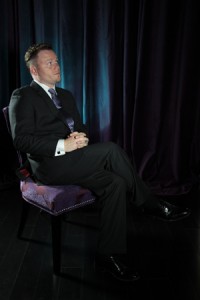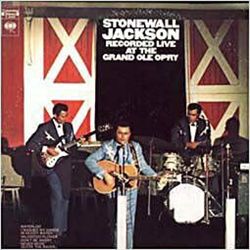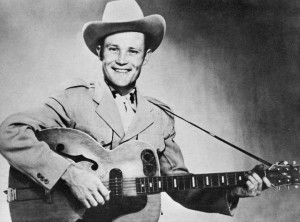“We Are America (The Toast).”
Music Charts Magazine brings to you a Celebrity Interview with Josh (Joshua) Cobb of Legacy Five, Gold City and now “The American Three”
– this interview was done by:
Big Al Weekley’s(Americana/Gospel Show) which can be heard every Sunday morning on KRVN’s 50,000 watt “880 AM Rural Radio” – located in Lexington, Nebraska.
KRVN.com – “The Voice of the Midwest”
Listen to Josh Cobb’s interview by pushing play below on the red player:
A little bit about Mr. Josh Cobb –
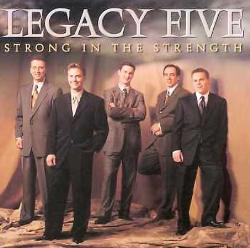 Josh Cobb with “Legacy Five Quartet”:
Josh Cobb with “Legacy Five Quartet”:
Legacy Five is a Southern Gospel Quartet founded by former Cathedral Quartet members Roger Bennett and Scott Fowler after the owners of the Cathedral Quartet, Glen Payne and George Younce, decided to retire in 1999. Group members attribute their success to the changing face of gospel music and their willingness to adapt to it. As a result, the group has won numerous awards.
The group is co-owned by Scott Fowler and Debbie Bennett.
Legacy Five’s very first lineup consisted of tenor Josh Cobb (right), lead Scott Fowler, baritone Scott Howard, bass Glenn Dustin, and pianist Roger Bennett. Bennett supplied a fifth vocal part in some songs, but when he sang, it was mainly for verses. The group enjoyed great success with their first album release, Strong In The Strength. The group’s first Top 10 hit, “I Stand Redeemed”, featured young tenor Josh Cobb. Cobb won the Horizon Individual award at NQC in 2000.
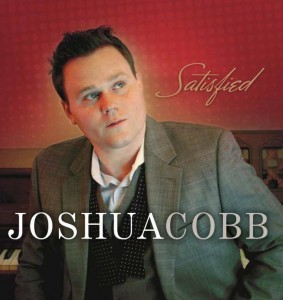 Josh Cobb with “Gold City Quartet”:
Josh Cobb with “Gold City Quartet”:
The Mississippi-based Christianairs were renamed Gold City in Dahlonega, Georgia at the stroke of midnight on New Year’s Eve to begin the year 1980 with bass Dallas Gilliland, tenor Bob Oliver, lead singer Jerry Ritchie, and baritone Ken Trussell. The group’s owner was initially Floyd Beck, who sold the quartet to Tim Riley, Ivan Parker, Brian Free, and Gary Jones. Bass Tim Riley would replace Gilliland as the permanent bass singer in July of that same year. The group was an instant success in the industry, appearing on the main stage of the National Quartet Convention in October 1981. By 1982, tenor Brian Free, lead Ivan Parker, and pianist Garry Jones had joined Riley to form a consistent nucleus that remained together until the end of 1993. Mike LeFevre joined in 1985 to sing baritone, replacing Jerry Ritchie.
On April 28, 2009, tenor, Steve Ladd, announced that he would be leaving Gold City. On June 17, 2009, it was announced that Chris Cooper would be filling the tenor position. It was announced in July 2009 that Josh Simpson would be leaving Gold City in August to go to college. His temporary replacement was Curtis Broadway who played on Band of Gold dates. Gold City Bus driver Jim Korn filled in on keys after the Band of Gold quit traveling with the group. It was announced on August 11. 2009 that Aaron McCune had departed Gold City and a replacement was being sought.
Later in December, it was announced that Chris Cooper left Gold City and a replacement would be found by the end of Christmas break. Over the Christmas break, it was announced that former Legacy Five tenor Josh Cobb would be joining the group, and former Ernie Haase & Signature Sound pianist Roy Webb would join as the pianist. It was also announced that Tim Riley would be committed to full-time traveling with Gold City.
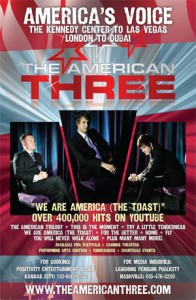 Current: Josh Cobb with “The American Three”:
Current: Josh Cobb with “The American Three”:
With select ingredients, a gourmet feast suitable for the most discerning taste, is the savory result.
Such is the musical recipe of three extraordinary singers; Josh Cobb, Sam Swerczek and Nathan Mickle. In a delectable combination of uniquely American and singularly gifted vocalists, the three men have formed “The American Three”.
The vision of producer Vince Kavanaugh, The American Three is a group that strives to represent the entire nation in song with a spirit of hope and kindness. A tremendous fan of the award winning Canadian Tenors, Kavanaugh set off to find three men in America who shared his vision.
Utilizing the tools of traditional networking and contemporary social media, Kavanaugh launched a search for three stellar talents who would become one voice. After finding Josh, Sam and Nathan, an exhaustive search for material and months of rehearsals began. The magic in the studio was undeniable as producer and artists heard and felt the titillating sense of hope and inspiration as each song was recorded.
With equal parts Broadway, Rat Pack, Pop, Great American Songbook and beloved classics, The American Three delivers a collection that will surely appease a broad range of musical tastes. The album is reflective of the group’s live performance; steeped in the tradition of great vocalists and yet contemporary in production with brilliant onstage dynamics.
The debut project, One, includes eleven brilliantly arranged tunes, including the patriotic single, “We Are America (The Toast).”
Music Charts Magazine Celebrity Interview with Grand Ole Opry Star Stonewall Jackson ( by Big Al Weekley )
Stonewall Jackson (born November 6, 1932) is an American country singer and musician who achieved his greatest fame during country’s “golden” honky tonk era in the 1950s and early 1960s.
Stonewall is not a nickname; he was named after (and claimed to be a descendant of) the Confederate Gen. Thomas “Stonewall” Jackson. His father died when he was two and his mother moved the family to South Georgia. Jackson grew up there working on his uncle’s farm. Jackson enlisted in the Navy in 1950 and was discharged in 1954. He moved to Nashville, Tennessee in 1956.
Jackson became the first artist to join the Grand Ole Opry before obtaining a recording contract. He toured with Ernest Tubb, who became his mentor. Jackson signed to Columbia Records and debuted in 1958 with “Don’t Be Angry”. The song did not score in the country music top 40, but it got him recognition.
His breakthrough came in the country Top 40 in late 1958, with a song written by a young George Jones, “Life to Go”. It peaked at No. 2 in early 1959 and his follow-up record, “Waterloo”, was No. 1
for five weeks and crossed over into the Top 40 of the Billboard Hot 100 chart, where it reached No. 4. The track also reached No. 24 in the UK Singles Chart in July 1959. It sold over one million copies, and was awarded a gold disc.
From 1958 to 1971, Jackson had 35 Top 40 country hits. Along with Ray Price, Jackson is considered a cornerstone, after Hank Williams and Lefty Frizzell, of the hard-driving honky tonk sound in the late 1950s and early 1960s.
Read more at:
http://en.wikipedia.org/wiki/Stonewall_Jackson_(musician)
Click the play button below to listen to the Celebrity Interview with Stonewall Jackson
